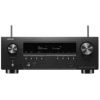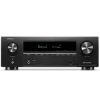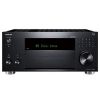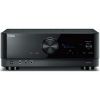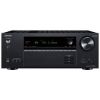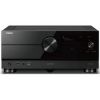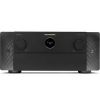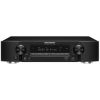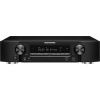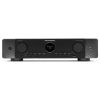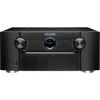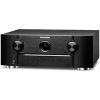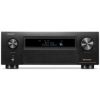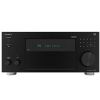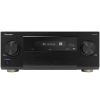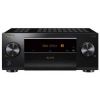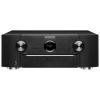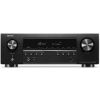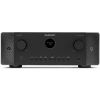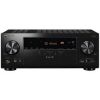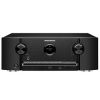Onkyo TX-NR696 vs Pioneer VSX-934 review
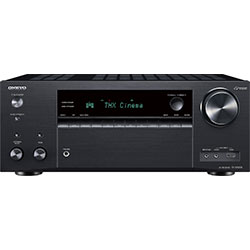
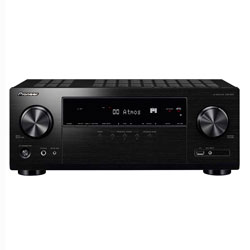
Let's compare Onkyo TX-NR696 versus Pioneer VSX-934 for an overview of all their pros and cons. According to the results of our review, Onkyo TX-NR696 received 7.6 points out of 10 possible, and Pioneer VSX-934 was rated 7.4 points. Both AV receivers were introduced in 2019. And as a result of the comparison, TX-NR696 seems to be a better option for the role of a home theater center than VSX-934.
Main advantages Onkyo TX-NR696 over Pioneer VSX-934
- ✔ We do not know advantages
Main advantages Pioneer VSX-934 over Onkyo TX-NR696
- ✔ We do not know advantages
Amplifiers
For the built-in amplifier, the models have rated 7 points out of 10.
The number of channels is equal to the number of possible connected speakers. Both receivers can handle the 7.2-channels configuration.
RMS stands for the actual power of the receiver. The higher this value, the louder the sound can be produced. In terms of RMS power, the models have the same characteristics - 165/6/6 W/Ohm.
| TX-NR696 | VSX-934 | |
|---|---|---|
| Channels | 7.2 | 7.2 |
| Stereo power (RMS), W/Ohm | 165/6 | 80/8, 165/6 |
| Output impedance, Ohm | 6 | 8, 6 |
| Frequency response | 10Hz-100KHz | 10Hz-100KHz |
| THD in stereo, % | 0.08 | 0.08 |
Audio features
The score for audio features is 9 of 10 for both receivers.
Most receivers now come with a microphone included. It is with the help of this microphone that the auto-calibration system functions, which adjusts the sound of the receiver to the room.
| TX-NR696 | VSX-934 | |
|---|---|---|
| Digital to analog converter (DAC) | AK4458 384 KHz/32-bit | AK4458 384 KHz/32-bit |
| Bi-amping | ✔ | ✔ |
| Pure direct (straight) | ✔ | ✔ |
| Auto speaker calibration | AccuEQ | MCACC |
| Speaker A/B switching | ✖ | ✖ |
| Other audio features | Advanced Music Optimizer, Theater-Dimensional, Hi-Res audio | Advanced Sound Retriever |
Connectivity
The connectivity of competitors in our comparison is equal and was rated 8 out of 10.
Bluetooth connection is now one of the main communication protocols for the receiver's control or even music broadcasting.
| TX-NR696 | VSX-934 | |
|---|---|---|
| Wi-Fi | ✔ | 2.4/5GHz |
| USB | 1 (USB 2.0) | 2 (USB 2.0) |
| Bluetooth | ✔ | ✔ |
| Ethernet (RJ45) | 1 | 1 |
| DLNA | ✖ | ✖ |
| MHL | ✖ | ✖ |
Streaming services
Now music streaming services are gaining more and more popularity. They allow users to listen to millions of songs by subscription.
| TX-NR696 | VSX-934 | |
|---|---|---|
| Apple Music (AirPlay) | AirPlay, AirPlay 2 | AirPlay, AirPlay 2 |
| Amazon Music | ✔ | ✔ |
| Spotify | ✔ | ✔ |
| Other streaming services | Deezer, TIDAL, Pandora, TuneIn Radio | Deezer, TIDAL, Pandora |
Extensive connections
The presence of many connectors makes the receiver more versatile. But there are also narrowly targeted models, the number of connectors which are limited to a certain area of use. And when choosing their own receiver, users need to consider exactly your goals for using the receiver. For extensive connection, both receivers got 7 points on our 10-point scale.
Onkyo TX-NR696 is equipped with 7/2 HDMI inputs and outputs, and Pioneer VSX-934 has 6/2 HDMI inputs and outputs.
| TX-NR696 | VSX-934 | |
|---|---|---|
| HDMI input/output | 7/2 | 6/2 |
| HDMI ARC (Audio Return Channel) | ✔ | ✔ |
| HDMI eARC (Enhanced Audio Return Channel) | ✖ | ✖ |
| HDMI CEC | ✔ | ✔ |
| Digital content protection (HDCP) | HDCP 2.2 | HDCP 2.2 |
| Subwoofer output (LFE) | 2 | 2 |
| Headphone output | 1 x 6.3 | 1 x 6.3 |
| Optical digital input | 1 | 1 |
| Coaxial digital input | 1 | 1 |
| Composite input | 0 | 0 |
| Component input/output | 0/0 | 0/0 |
| Phono (MM) input | ✔ | ✔ |
| Front panel connectors | HDMI, phones, setup mic, AUX | USB, phones, setup mic, AUX |
| Multi channel preamp output | ✖ | ✖ |
Video features
The AV receiver is the heart of the home theater. And in this case, support for all current video formats ensures the best user experience, so it is very important to consider this when choosing a device. Video features of the TX-NR696 were rated 8 out of 10 against the 10 for the VSX-934.
| TX-NR696 | VSX-934 | |
|---|---|---|
| HDR (High Dynamic Range) | HDR10 | HDR10 |
| 4K signal pass-through | 4K/60Hz | 4K/60Hz |
| 8K signal pass-through | ✖ | ✖ |
| HDMI signal pass-through | ✔ | ✔ |
| 3D signal pass-through | ✔ | ✔ |
| HDMI pass-through in standby mode | ✔ | ✔ |
| Video conversion | analog to HDMI | analog to HDMI |
| Analog to HDMI scaling | ✖ | ✔ |
| HDMI to HDMI scaling | ✔ | ✔ |
| Dolby Vision | ✔ | ✔ |
| Other video features | DeepColor, x.v.Color, HLG, BT.2020 | HLG, BT.2020 |
Additional features
In terms of evaluating additional features, the TX-NR696 got 9 points, but the VSX-934 has 6.
Voice control allows you to control the basic functions of the receiver through a smartphone, smart speaker or using the microphone that comes with the kit. The TX-NR696 can be controlled by voice via Google Assistant.
| TX-NR696 | VSX-934 | |
|---|---|---|
| Voice control | Google Assistant | ✖ |
| App control | iPhone, iPad, iPod, Android | iPhone, iPad, iPod, Android |
| Display | fluorescent | colour OSD |
| Tuner | AM, FM | AM, FM |
| Sleep timer | ✔ | ✔ |
| Auto power off | ✔ | ✔ |
| ECO mode | ✖ | ✖ |
| Graphical user interface (GUI) | ✔ | ✔ |
| Setup assistant | ✔ | ✔ |
| Firmware update | network, USB | network, USB |
| Other additional features | has not | has not |
Multi-room
As the center of a home media system, each multichannel receiver has an additional set of terminals for connecting the second set of speakers to create additional audio space in Zone 2 or even Zone 3 where audio can have the separate source.
| TX-NR696 | VSX-934 | |
|---|---|---|
| Multi-room zones | 2 | 2 |
| Zone audio output | speaker, preout | speaker, preout |
| Zone HDMI output | ✔ | ✔ |
| Multi-room control | FlareConnect | FlareConnect |
| RS-232 | 0 | 0 |
| Remote control input/output (IR) | 0/0 | 0/0 |
| DC trigger output (12V) | 0 | 0 |
Multichannel surround
For the ability to create multichannel surround sound, each of the receivers received 7 points out of 10.
| TX-NR696 | VSX-934 | |
|---|---|---|
| Dolby Atmos | ✔ | ✔ |
| Dolby TrueHD | ✔ | ✔ |
| Dolby Surround | ✔ | ✖ |
| Dolby (other) | Dolby Digital Plus, Dolby Atmos Height Virtualization | Dolby Digital Plus, Dolby Atmos Height Virtualization |
| DTS:X | ✔ | ✔ |
| DTS HD Master | ✔ | ✔ |
| DTS Virtual:X | ✔ | ✔ |
| DTS Neural:X | ✔ | ✔ |
| DTS (other) | DTS-ES, DTS 96/24, DTS-HD, DTS-EXPRESS | DTS-ES, DTS 96/24, DTS-HD, DTS-EXPRESS |
| Auro-3D | ✖ | ✖ |
| IMAX Enhanced | ✖ | ✖ |
| Multichannel stereo | ✖ | ✖ |
Popular receiver comparisons
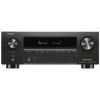
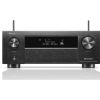
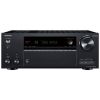
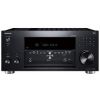

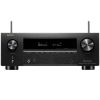

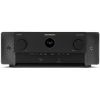
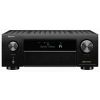

Latest receiver comparisons
